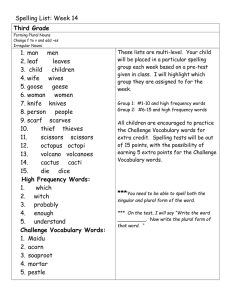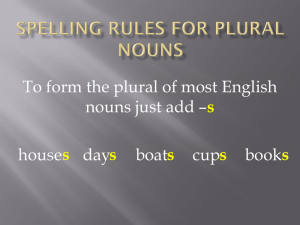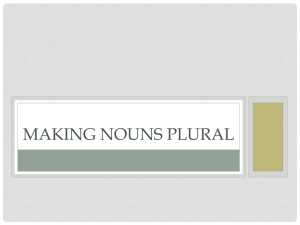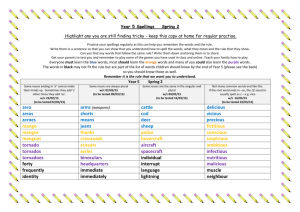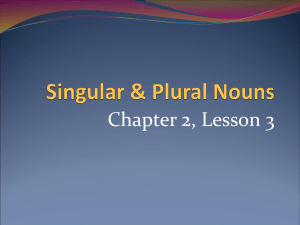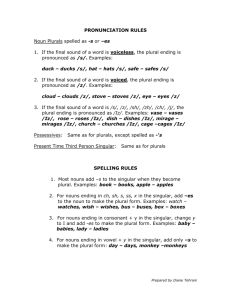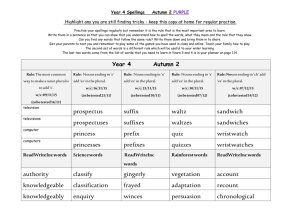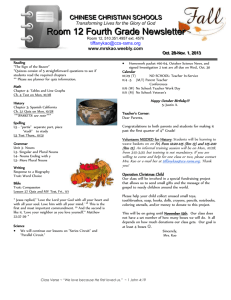Noun_Number - SOU stavební, Opava, po
advertisement
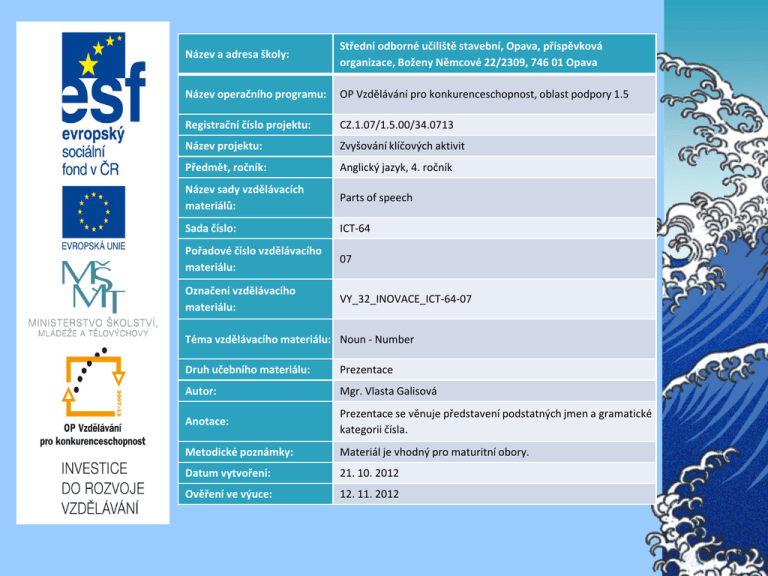
Název a adresa školy: Střední odborné učiliště stavební, Opava, příspěvková organizace, Boženy Němcové 22/2309, 746 01 Opava Název operačního programu: OP Vzdělávání pro konkurenceschopnost, oblast podpory 1.5 Registrační číslo projektu: CZ.1.07/1.5.00/34.0713 Název projektu: Zvyšování klíčových aktivit Předmět, ročník: Anglický jazyk, 4. ročník Název sady vzdělávacích materiálů: Parts of speech Sada číslo: ICT-64 Pořadové číslo vzdělávacího materiálu: 07 Označení vzdělávacího materiálu: VY_32_INOVACE_ICT-64-07 Téma vzdělávacího materiálu: Noun - Number Druh učebního materiálu: Prezentace Autor: Mgr. Vlasta Galisová Anotace: Prezentace se věnuje představení podstatných jmen a gramatické kategorii čísla. Metodické poznámky: Materiál je vhodný pro maturitní obory. Datum vytvoření: 21. 10. 2012 Ověření ve výuce: 12. 11. 2012 Parts of speech Noun - Number Introduction Singular (sg.) – one object (a book, a boy) or invisible whole (snow, friendship). Plural (pl.) – more than one object (books, boys). Regular plural by adding -s cat → cats; book → books; room → rooms; by adding -es (nouns ending in -s; -ss; -x; -ch; -sh; -tch) bus → buses; glass → glasses; box → boxes; bench → benches; brush → brushes; match → matches; Note: Nouns ending in -o by adding –es: hero → heroes; tomato → tomatoes; etc. Nouns ending in -o by adding –s: auto → autos; piano → pianos; radio → radios; kilo → kilos; etc. Nouns ending in -o by adding –s or –es : commando → commandos/commandoes etc. Note: Nouns ending in -y after a consonant change –ies: baby → babies; country → countries; lady → ladies; fly → flies; etc. Nouns ending in -y after a vowel again by simply adding –s: boy → boys; day → days; key → keys; etc. Irregular plural Nouns ending in -f; -fe change –ves: half → halves; life → lives; thief → thieves; shelf → shelves; etc. Mutation: foot →feet; goose → geese; man → men; woman → women; mouse → mice; tooth → teeth; etc. Zero plural Name of certain animals (hunting): deer; salmon; sheep; etc. This sheep is from Australia. These sheep are from Australia. Craft and certain nationalities: The craft was sunk. All the craft were sunk. He is a Vietnamese. The Vietnamese are noted for their cookery. Collective nouns Which have plural forms: Impersonal (whole):The government is trying to control inflation. Personal (members): The shadow government are calling for a general election soon. Or a lot of: The governments in all countries are trying to control inflation. Collective nouns Which do not have plural forms: The youth of today is/are better off than we used to be. Give the public what it wants/they want. Be careful! Nouns with a plural form + sg. verb: The news is bad today. Nouns with a plural form + pl. verb: My trousers are wet. (glasses, scissors, scales, etc.) !The police are looking for them.! Plural with different meanings Colours – barvy/zástava (vlajka). Compasses – buzoly/kružítko. Draughts – průvany/dáma (hra). Grounds – podlahy/usazenina. Spirits – destilát/duševno. Literatura ALEXANDER, L. G. Longman English Grammar. 1. vyd. London and New York: Longman, 1988. ISBN 0-582-55892-1. SVOBODA, A., KUČERA, K. English Parts of Speech. 1. vyd. Opava: SU v Opavě, 2005. ISBN 80-7248-199-1. Write plural of these words: boy → knife → brush → watch → foot → man → family → potato → leaf → radio → lady → toy → Děkuji za pozornost.
